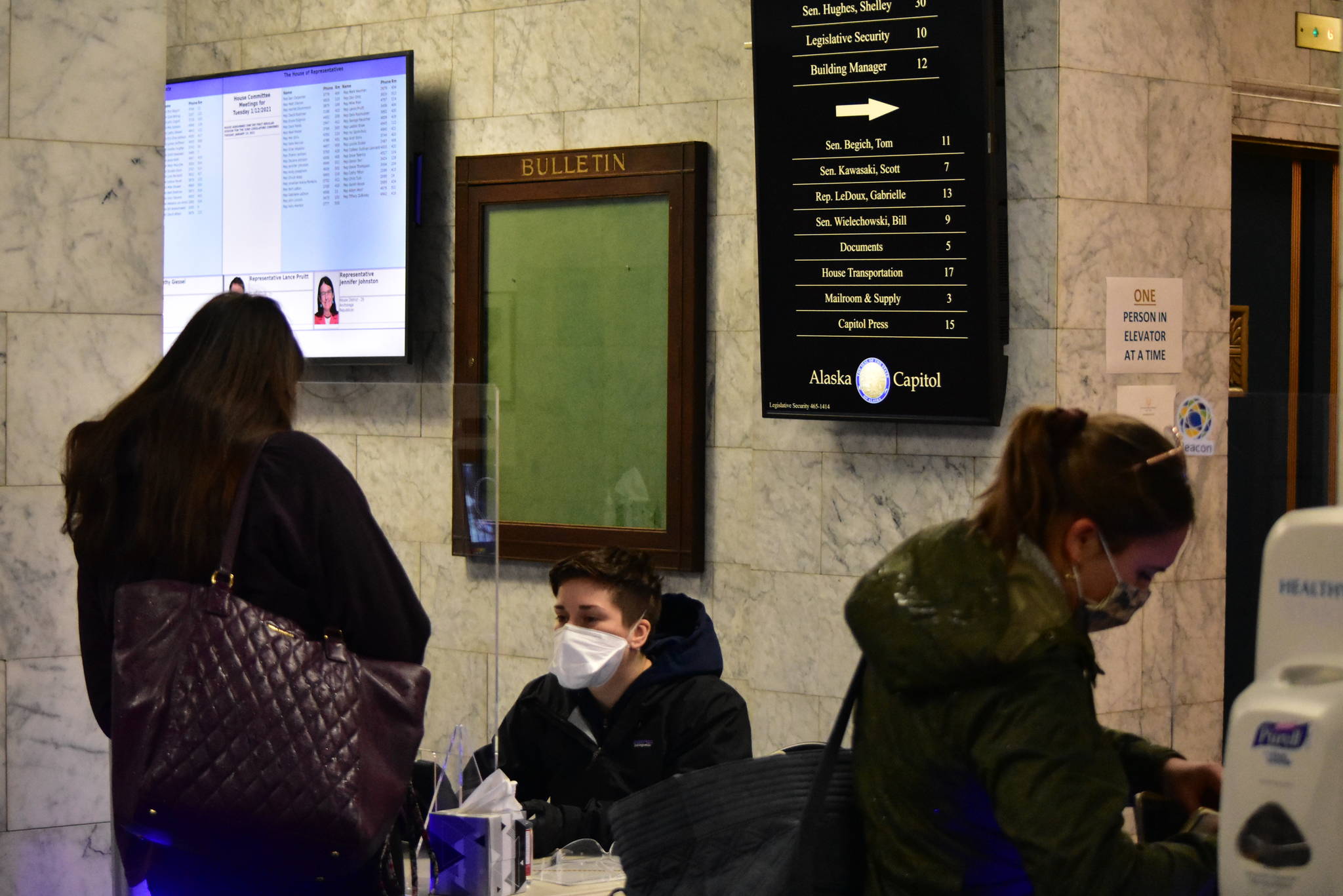The upcoming legislative session is likely to be dogged by the same issues that have frustrated Alaska politics for years, according to members of Juneau’s delegation, who spoke with city leaders Tuesday at their annual meeting.
“The dominant issues will be what they have been,” said Sen. Jesse Kiehl, a Democrat and Juneau’s only senator. “In the governor’s budget there are calls for revenue, but it doesn’t say what.”
The delegation met with the City and Borough of Juneau Assembly to discuss the city’s priorities. Perennial issues such as the Permanent Fund Dividend, the Alaska Marine Highway System and school-bond debt reimbursement were likely to dominate the session, Kiehl said.
The budget proposed by Gov. Mike Dunleavy in December will require the Legislature to come up with $1.2 billion in additional revenue by the 2023 fiscal year, which starts July 1, 2022, or else state services will have to be reduced to cover the cost. If lawmakers choose revenue such as taxes, legislative fiscal analyst Alexei Painter said at a Jan. 8 meeting, it would be best to pass that legislation this year because it will take time to set such a program up.
Rep. Sarah Hannan, D-Juneau, pre-filed a state income tax bill which she said is similar to past bills, but she noted that other municipalities might favor a sales tax, which Juneau already has, over an income tax.
Neither the House nor the Senate had elected new leadership, Kiehl said, which means that committee assignments have not been given. At the beginning of the last session of the Legislature, lawmakers took more than a month to organize leadership, and on Tuesday Hannan said she didn’t think the House would be able to agree on organization by the start of the session on Jan. 19.
Partisanship was high, said Juneau’s other House Representative, Andi Story, also a Democrat, but she hoped having lawmakers together at the Capitol would lead to more civil conversations. Story said she hoped to find common ground with her colleagues through a mutual love of Alaska.
“I believe our citizens want that,” she said.
[New revenue or no service, lawmakers weigh options]
City leaders had their own list of long-running concerns, among them keeping state jobs in Juneau. The pandemic increased the use of teleconferencing, Kiehl said, which was opening up where state workers were able to live. The delegation was working with department commissioners and leaders to discuss flexibility when it came to the placement of state jobs.
Sutton Republican Rep. George Rauscher pre-filed a bill that would move legislative sessions to Anchorage.
“Zoom is the single greatest threat to Juneau losing the capitol,” assembly member Wade Bryson said, speaking via Zoom. “Anything that we can do to limit the power of Zoom.”
Some state workers had even begun working from outside Alaska, Kiehl said, something he said was unacceptable and untenable.
Also part of the governor’s proposed budget is more than $300 million in infrastructure bonds. But those bonds would be used to fund shovel-ready projects throughout the state. Kiehl expressed skepticism that lawmakers would be able to select a comprehensive list of projects that satisfied the needs of Alaska communities. Hannan, whose district includes Haines and Skagway, said she has been in contact with those municipalities to have them draw up a list of projects they’d like to see completed.
But the state has already faltered on its payments for school bonds, Deputy Mayor Loren Jones said, and there is plenty of existing infrastructure that needs funding for repairs. Bonds for new projects while the city has been trying to get state funding for infrastructure repairs “doesn’t make sense to me.”
Jones asked if the state could simply bond money directly to municipalities, which could then decide how best to appropriate the money. Hannan told assembly members that if the state’s lawyers allow them to, that’s what the delegation will try to do.
Legislative Legal Services did not respond to request for comment.
Dunleavy is also proposing an extra draw on the Permanent Fund to pay a supplemental Permanent Fund Dividend for 2020 and a $3,000 PFD for 2021, an influx of cash he says will help stimulate the economy. But that extra draw would come at the cost of future revenue from the fund, Painter told lawmakers, meaning higher taxes or fewer services.
Based on the campaign rhetoric of some of the new members, Hannan said some seemed to believe “we can cut our way to a balanced budget.”
But that kind of budget didn’t meet the needs of Alaskans, she said.
“That means not plowing highways, reducing critical services and transportation infrastructure. I’m not really seeing that that’s universally understood.”
• Contact reporter Peter Segall at psegall@juneauempire.com. Follow him on Twitter at @SegallJnuEmpire.

